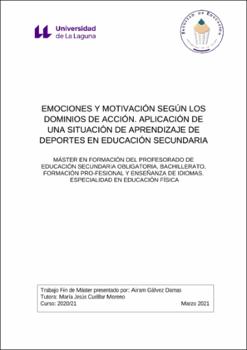Emociones y motivación según los dominios de acción. Aplicación de una situación de aprendizaje de deportes en educación secundaria
Author
Gálvez Damas, AiramDate
2021Abstract
La educación física ejerce un papel destacado en la educación de competencias
emocionales, las cuales repercuten directamente en el rendimiento académico y
en la mejora del bienestar subjetivo, así como en la adherencia a la práctica de
actividad física a lo largo de la vida del alumnado. En este estudio nos
proponemos analizar las diferencias a nivel motivacional en deportes con
diferentes dominios de acción motriz planteados en un aula educación física en
el primer nivel de Educación Secundaria. Para ello, hemos elaborado una
situación de aprendizaje de 8 sesiones, donde analizaremos que emociones
surgen en el alumnado según los diferentes dominios de acción motriz para
relacionarlas con la motivación del alumnado en cada una de dichas situaciones.
La motivación en diferentes dominios de acción motriz se cuantificará mediante
el cuestionario Games and Emotion Scale, validado por Lavega, March y Filella
(2013). Este cuestionario analiza las emociones (positivas, negativas y
ambiguas. Por otro lado, se llevará a cabo el cuestionario PMCSQ-2 de Newton,
Duda y Yin (2000), que nos permitirá conocer el clima motivacional del alumnado
de las sesiones y relacionarlo con el instrumento anterior. Estos instrumentos
nos permiten identificar las emociones surgidas y la intensidad con la que lo
hacen, además de las características motivacionales, dependiendo si las tareas
se realizan de manera psicomotriz, con oposición, en cooperación o con
cooperación-oposición Physical education plays a leading role in the education of emotional skills, which
have a direct impact on academic performance and the improvement of
subjective well-being, as well as adherence to the practice of physical activity
throughout the life of students. In this study we propose to analyze differences at
the motivational level in sports with different domains of motor action posed in a
classroom physical education in the first level of Secondary Education. To do this,
we have developed an 8-session learning situation, where we will analyze what
emotions arise in students according to the different domains of motor action to
relate them to the motivation of the students in each of these situations.
Motivation in different motor action domains will be quantified through the Games
and Emotion Scale questionnaire, validated by Lavega, March and Filella (2013).
This questionnaire analyzes emotions (positive, negative and ambiguous. On the
other hand, the PMCSQ-2 questionnaire of Newton, Duda and Yin (2000) will be
carried out, which will allow us to know the motivational climate of the students of
the sessions and relate it to the previous instrument. These instruments allow us
to identify the emotions that arise and the intensity with which they do so, in
addition to the motivational characteristics, depending on whether the tasks are
performed in a psychomotor way, with opposition, in cooperation or with
cooperation-opposition.




